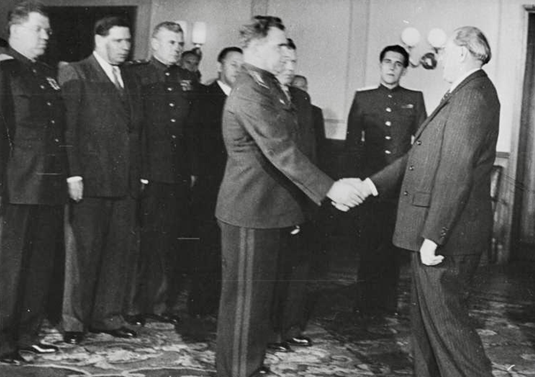The Summer of 1942...
- Maria A. Kithcart

- Jul 13, 2022
- 3 min read

Pictured: Lieutenant-General V. I. Chuikov, Stalingrad, 1943.
Eighty-two years ago, during the summer of 1942, the Germans were engaged in their campaign deep into southern Russia. Codenamed Case Blue, Army Group South’s main strategic objective was to capture the oil-rich Caucasus region, a resource the Germans desperately needed to continue the war. Before the invasion of the Soviet Union, the Germans bought oil supplies from Russia to support their blitzkrieg tactics. However, once Operation Barbarossa began in June 1941, the Germans had to depend upon only Romania for their petroleum supply.
After plans for Case Blue were set into action, Hitler decided that he also wanted to capture Stalingrad, a city on the Volga River named after his arch-nemesis. The city was located along the western bank of the river and was the home of several factories, namely the Red October (Krasny Oktyabr) Tractor Plant. In my studies of the Battle for Stalingrad, opinions about the city's strategic importance differ. In some instances, Stalingrad was considered a point on the Volga at which the Germans could halt Russian shipment of supplies. However, there are historians who view the city as having little to no strategic value, but a political value instead. Taking the city of Stalingrad would have dealt a significant blow to the morale of the Soviets and Russians in particular, as the river has often been referred to as “Mother Volga.” The river not only fed the local population, but it provided a means for expansion and trade.
The importance of Stalingrad's defense was felt throughout the Soviet Union. Hitler's declaration that every male resident of Stalingrad would be killed and every woman deported, according to The History Channel, set the stage for a bloody, hard-fought battle. As a means of defense, Stalin instructed all Russians who were strong enough to hold a rifle to take up arms. Protecting the city was a high priority and was eventually entrusted to Lieutenant-General Vasily Ivanovich Chuikov. In another blog post, I shared his perspective on the battle as well as the importance of the massive victory in turning the tide of the war.
Chuikov was a literal force of nature, a strong-willed warrior who never surrendered to an enemy during his military career. In his book titled The Battle for Stalingrad, Vasily Ivanovich recalled the day in 1942 when he was almost paralyzed due to a drunk driving accident caused by his driver. Despite this severe injury, his strength of will and sheer physicality allowed him to return to duty quickly, in time to take decisive action during the Great Patriotic War in the pivotal battle on the Volga.
“In May I was appointed Acting Commander of the reserve army spread out over the Tula region, where, during May, June, and early July it underwent intensive military training. One day I stayed on at H.Q. until midnight and then set off back to my quarters. I did not notice what state the driver, Grinev, was in. He started up the car with a jerk, and it rapidly began to gather speed. ‘Grinev, don’t drive so fast,’ I warned him, but he appeared not to understand me. The car was gaining in speed all the time, and at a bend in the road, it overturned. Trying to crawl out from under the wreckage I lost consciousness. Who picked me up and how I was taken home I don’t remember.
‘You have injured your spine,’ the doctor told me. ‘You’ll have to stay on your back.’ For a few days, I lay on a special bed, strapped down by the shoulders and legs, being given traction treatment. However, healthy and hardy by nature, I was on my feet again in a week, though I walked with a stick. At the beginning of July, an order came through from G.H.Q. renaming the reserve army the 64th Army, and transferring it to the Don” (18-19).



